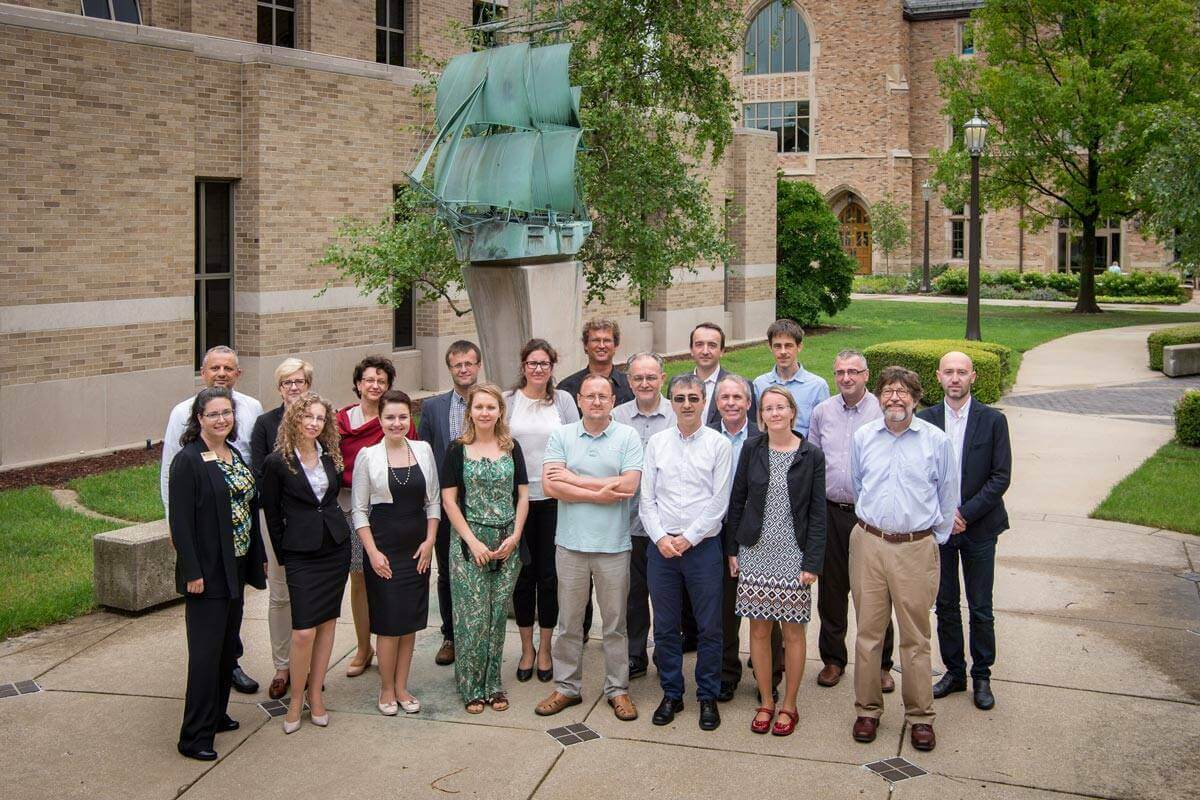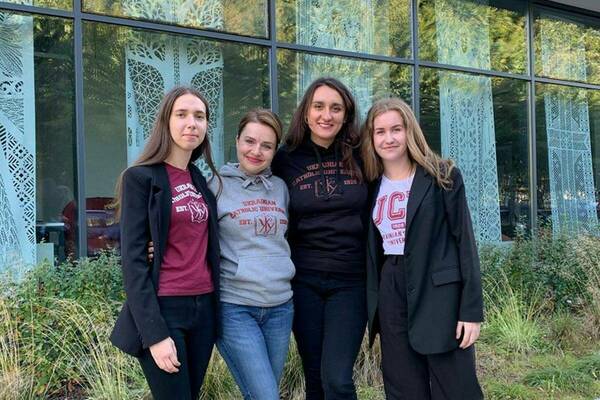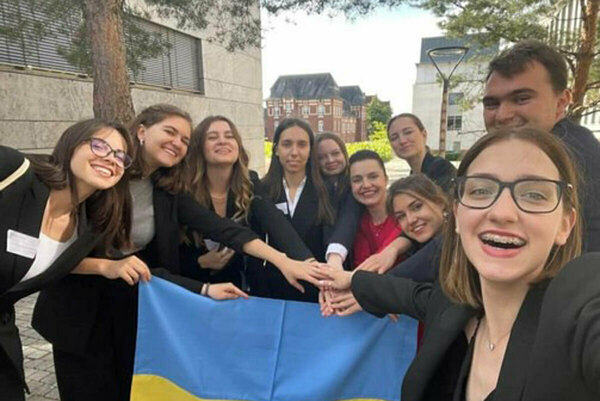Halyna Protsyk is the director of the International Academic Relations Office and a lecturer in the Department of Political Science at the Ukrainian Catholic University, Lviv. She is also a trainer for the Ukrainian student delegation to the National Model United Nations (New York, USA). Protsyk participated in the Catholic Leadership Program at Notre Dame in 2017 and in the Advanced Leadership Program in Rome in 2022, initiatives of the Catholic Universities Partnership that are facilitated by the Nanovic Institute for European Studies.
I dedicate this story to all partners of the Ukrainian Catholic University and the global academic community with gratitude for the incredible power of international academic solidarity and partnership, which supports the lives of many Ukrainian students and teachers affected by the war as well as unites our efforts towards designing Ukraine’s restoration. — Halyna Protsyk
“We know ourselves only as far as we’ve been tested.” Most recognize this line from a poem by Polish Nobel laureate Wislawa Szymborska. It is difficult to imagine a more serious test of leadership and solidarity than war, and all the horrors and suffering that accompany it. War sharpens and brings into focus the entire value and ethics systems that a person cultivates throughout their life. In war there are only two options — either you call evil as evil and persistently fight against it, enforcing your victory in the right to remain a human and a Christian, or you try to look for a compromise with evil, eventually losing yourself and being defeated.
This is my personal lesson. Living in a country where a cruel and unjust war has been going on for seven months has taught me that there is no third way. Instead, this life experience has shown me how important it is to not let go of God’s hand, to understand yourself, your inner, God-given strength, your community, and the values that underpin the bonds you share with your family, colleagues, and community both at home and around the world. In scenarios like this, the Catholic Leadership Programs, facilitated by the Nanovic Institute as part of the Catholic Universities Partnership, not only prepared me to test my own leadership in the context of wartime uncertainty but also empowered me and my team to activate our strengths even when the situation has seemed to be hopeless.
Leading UCU’s International Office in a time of war
I admit that before the summer of 2017, I had never immersed myself in reflection about my leadership potential. This changed when I attended the Catholic Leadership Program at the University of Notre Dame. That year’s program was dedicated to “strengths-based” leadership and was led by Rev. Dr. Eric Zimmer. He offered us a rather entertaining Gallup 34 StrengthsFinder methodology to reveal our top-5 leadership characteristics, which we could later implement within what Fr. Zimmer described as our particular apostolic workspace, that is any space — workplace, home, community — where we can witness and serve. After taking that comprehensive test, I found that four out of five of my top strengths were related to relationship building: harmony, positivity, developer, and empathy. I was very surprised by this combination, which was framed by only one strength in executing: achiever.

I had no way of knowing then that the clear, on-paper identification of these inner qualities would enable me to walk side-by-side with my team through all the challenges and horrors of war. Little did I know how the relationships we built within the team at the International Office and with our CUP partners would bind us in solidarity and turn our fears and challenges into significant opportunities for our community and the Ukrainian Catholic University.
I encountered new tests as the leader of UCU’s International Office in a time of war. Even though UCU had several scenarios in place for university-wide crisis management in response to the disposition of enemy troops near Ukraine’s borders, neither I nor my three colleagues were emotionally ready for a full-scale war and an attack of such brutality. We did not believe that this day would come. However, on February 24, we all woke up to the horror of a terrifying new reality. I was calm. At one point I received a message of hope from my own leader, UCU Rector Fr. Bohdan Prach, who called on the university community to avoid giving in to panic and to unite not only in prayer but in precisely coordinated actions.
Against all the odds, I tried to remain positive and express enthusiasm that I knew would be contagious. I instinctively wished that my colleagues would become released from fear by busying themselves with helping others and making productive decisions. For my team, our first priority was ensuring that our families were relatively safe. We immediately shifted to working remotely from home which would allow us to prioritize our own safety and that of our loved ones, but also maintain focus on solving those operational challenges that required our attention in the first days of the war.
“It was very important for us to not just maintain communication but to build another bridge of trust, sending daily appeals as evidence of our resilience and indomitability and our great confidence in the strength of global academic solidarity in the fight against the aggressor.”
In these early days, the first tasks and duties of the entire International Office included making UCU’s appeals heard around the world and fostering solidarity among academic partners outside of Ukraine. We knew that we were responsible for crisis communication in a war that is hybrid and involves competing sources of information, so it was also important that our university’s response and position were carefully considered but also swift, offering leadership in the form of official statements and appeals to our partners all around the world. It was very important for us to not just maintain communication but to build another bridge of trust, sending daily appeals as evidence of our resilience and indomitability and our great confidence in the strength of global academic solidarity in the fight against the aggressor.
The UCU community took an active position and used all possible global academic platforms, such as the International Federation of Catholic Universities, the Federation of Catholic Universities in Europe, and the European Association of International Education to testify about the real threats and consequences of the Russian invasion for world order and security. Personally, the most significant event of my life took place in April 2022 when I spoke as a witness to the war in Ukraine in front of 3,500 students from over 100 countries who gathered in New York for the National Model United Nations, the world’s largest intercollegiate conference on diplomacy. This event marked the first live participation of Ukrainian universities in the National Model United Nations since its founding in 1927. In response, hundreds of letters of support and expressions of solidarity with our people began to arrive at UCU’s International Office. Crisis communication played a very important role in the activities of the International Office as it also set the tone for subsequent communications that accompanied the organization of an institution-wide package of support from our partners worldwide.
Building teamwork and global solidarity in support of students and faculty members
UCU’s partners did not leave us alone in this struggle but offered all kinds of support. In the first weeks of the military aggression, the UCU International Office team worked to overcome the many logistical and organizational challenges faced by hundreds of our students and teachers. We worked simultaneously in several areas. First of all, we had to ensure that all foreign students, teachers, and volunteers received the most comprehensive algorithm of actions and institutional support for safe evacuation from Ukraine. In parallel, we developed mechanisms and action plans to provide assistance to UCU students and faculty members who found themselves in various crisis situations. There were students who, at the start of hostilities, had completed academic exchange programs and were preparing to return home but found themselves trapped and unable to travel back to Ukraine.
In addition, around 10% of the university’s students and faculty had fled Ukraine. Grief and guilt competed with fear in their hearts and the International Office did everything possible to encourage them with empathy and ideas for how to help Ukraine from abroad. Some of them were hosted and supported by their friends or relatives living in Western countries and were able to follow classes online. But, the vast majority of students who fled needed an academic shelter, accommodation, and even financial support during their forced time abroad.
Responding effectively and meaningfully to urgent requests for support was crucial for our team, as was taking a more considered approach to coordinate our appeals and needs with our partners abroad. We have been working constantly with our partners to ensure the safety and security of our students, providing logistical and institutional support to get them to safety and ensure their smooth transition to exchange programs. It has been inspiring to see the breadth of support offered by our academic partners in neighboring countries and across the world. This has included support for special scholarships and housing for Ukrainian students and scholars, for the completion of the legal paperwork and visas required by students, employees, and their families abroad, in the area of personal well-being, and even in the collection of humanitarian aid for Ukrainian universities. More than 150 UCU students have received various types of support for a semester stay abroad during the seven months of the war.


Thinking about the future: establishing the Network of Solidarity and Strategic Partnership with Ukrainian Catholic University
With Russia willing to erase Ukrainian identity, education became another front on which we must fight for the future of our country. The war in Ukraine has resulted in more than 6 million Ukrainians fleeing to neighboring countries. This includes nearly 665,000 students (16% of the total number of students enrolled in higher education in Ukraine) and over 25,000 educators (6% of the country’s total of educators). Another 8 million Ukrainians are displaced internally. This poses massive challenges to Ukraine’s restoration, the continuation of academia and of the Ukrainian higher education sector in general. Networks and linkages across society are at risk of breaking entirely and there is the potential for a massive brain drain of those talented Ukrainian youth who have already started their early professional lives outside of our country.
Global academic solidarity will be crucial in our efforts to avoid these outcomes and to help displaced Ukrainians to maintain a sense of connection with universities in Ukraine. At UCU, for example, we launched the initiative Network of Solidarity and Strategic Partnership which aims to help Ukrainian students and faculty receive meaningful international experiences at world-class universities while remaining enrolled or employed by UCU. Our team has conducted hundreds of online meetings with valued partners from North and South America, Europe, and Asia offering different models of collaboration ranging from curriculum sharing, virtual exchange, global student talks, Ukrainian language training, and curriculum enrichment (through the sharing of scholarship on Ukraine in English) to traditional student exchange and joint research programs. Through these joint efforts and determination, our global academic solidarity has led to more than 35 long-term partnerships, half of which are within the Catholic academic family.
After seven months of tireless work, a phenomenal experience conducting bilateral and multilateral negotiations, building consensus and a sense of global solidarity, and defending Ukraine’s interests, I am very proud of our team and of our partners! We have achieved unprecedented results in such a difficult time for our country. Once we had the courage to unleash our team strengths, they were multiplied a hundredfold by the support and solidarity of our international partners.
Despite the harsh circumstances and no matter how great the challenges stemming from the crises of today, our spirit remains strong. Together with the help of our Lord, a strong Ukrainian Army, and inexhaustible global academic support, we have emerged stronger and prepared to defeat the evil that has rebelled against humanity.
Originally published by at crossingthesquare.nd.edu on October 20, 2022.